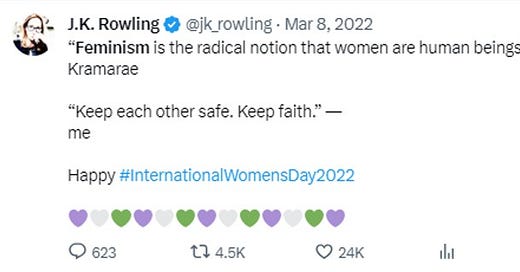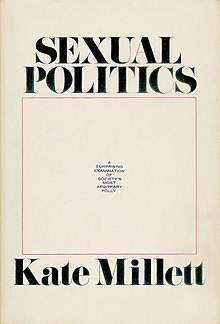The Feminist Touchstones of J. K. Rowling
Understanding the lake inspirations of feminism in the opus.
As part of our project to further ‘Fourth Generation’ scholarship of the works of J. K. Rowling,
and I have been looking for the inspirations behind her literature. The ‘lake’ in the ‘lake and shed’ metaphor for how she comes up with her enduringly successful stories. As part of my investigations John asked:What do we know about Rowling’s feminist touchstones and heroes, if any? Has she mentioned any Big Name Feminists that provide context for her gender-critical views?
In Rowling’s own words, feminism wasn’t one of the four reasons she gave for speaking out on sex and gender issues, they were:
Her charitable trust support children and vulnerable women, and she funds research into multiple sclerosis, that behaves very differently in men and women. These will be affected if the legal definition of sex is conflated with gender.
As an ex-teacher and founder of a children’s charity, she is concerned what the affect of gender ideology will have on child safeguarding.
As an author who is frequently banned, she will always support free speech.
She is concerned about the huge explosion in young women who are transitioning, and the potential that this might be driven by homophobic attitudes to same sex attraction.
Perhaps the most memorable passage of this essay however is redolent of second wave feminism:
We’re living through the most misogynistic period I’ve experienced. Back in the 80s, I imagined that my future daughters, should I have any, would have it far better than I ever did, but between the backlash against feminism and a porn-saturated online culture, I believe things have got significantly worse for girls. Never have I seen women denigrated and dehumanised to the extent they are now. From the leader of the free world’s long history of sexual assault accusations and his proud boast of ‘grabbing them by the pussy’, to the incel (‘involuntarily celibate’) movement that rages against women who won’t give them sex, to the trans activists who declare that TERFs need punching and re-educating, men across the political spectrum seem to agree: women are asking for trouble. Everywhere, women are being told to shut up and sit down, or else.
J.K. Rowling Writes about Her Reasons for Speaking out on Sex and Gender Issues
A short primer on the commonly described waves of feminism:
First Wave Feminism: the women’s suffrage movement of the late 19th and early 20th centuries, focusing on equal contract, marriage, parenting, and property rights for women.
Second Wave Feminism: beginning in the 1960’s and concentrating on social and legal equality for women. The women’s liberation movement.
Third Wave Feminism: from the 1990’s and focusing on individuality and diversity. Commonly called intersectional feminism, where different forms of oppression and marginalisation (other than sex) are identified and combined within feminism.
In the wonderful podcast, The Witch Trials of J.K. Rowling, Rowling gives some background to her feminism in episode 4:
“I was very feminist in my late teens, early twenties, and I was reading books that even then were a little outdated. People like Kate Millet, Germaine Greer and Simone de Beauvoir, obviously, who was dead by the time I came to her book. I would describe myself now and probably then, too, as an idealist, definitely, but never really an ideolog. I was, always, have been passionately concerned about the plight of girls and women, not only in the West, but further afield.”
Three feminist icons. de Beauvoir I know is frequently quoted (and misquoted), but the only one of the three I know is Germain Greer.
Germain Greer

I can’t remember when I first knew the name Germaine Greer, but I was born in the same year that her international best seller, foundational text of second wave feminism and first book, The Female Eunuch was published. Among the many mystery novels, my mother had a copy, and to my memory she had always had it. Battered and well thumbed. The book was memorable to me, not least for it’s iconic cover.

My mother was not exactly a typical 1970’s feminist. A stay at home mother and staunch Tory voter, I could no more imagine her burning her bra than I could allowing me to escape completing my chores. Before marriage my mother was in a technical profession (she was in charge of technical records at a nuclear power station), just as Anne Rowling was (she was training to be an Aircraft Mechanic at RNAS Arbroath). I am tempted to imagine J. K. Rowling reading her mother’s copy at the same age I did.
Sarah Ditum wrote that Greer:
doesn't get into trouble occasionally or inadvertently, but consistently and with the attitude of a tank rolling directly into a crowd of infantry
Not content with writing the defining book of second wave feminism, Greer has continued to court controversial topics such as the sex-gender debate as early as 1997 when she opposed the offer of a fellowship to a trans woman to a female college.
Simone de Beauvoir (1908-1986)

Beauvoir wrote novels, biographies and monographs on philosophy, and social issues but she is best known for her "trailblazing work in feminist philosophy", The Second Sex.
The Second Sex is Beauvoir's best-known and controversial books (banned by the Vatican). It is regarded by Francine du Plessix Gray as a ground-breaking work of feminist philosophy, and as the starting inspiration point of second-wave feminism.
Kate Millet (1934 - 2017)

Kate Millet has been described as "a seminal influence on second-wave feminism", and is best known for her 1970 book Sexual Politics, which was based on her doctoral dissertation at Columbia University.
Kate Millett was one of the first writers to describe the modern concept of patriarchy as the society-wide subjugation of women. Her biographer Gayle Graham Yates said that "Millett articulated a theory of patriarchy and conceptualized the gender and sexual oppression of women in terms that demanded a sex role revolution with radical changes of personal and family lifestyles".
So What?
J. K. Rowling has not let much slip around her feminism despite her now four year openness over her gender critical views. My understanding of the subject could be best described as that of a simpleton, but I hope with further study to find echoes of her second wave feminism in Strike’s in vino veritas at Max’s dinner.
‘The point is to destigmatise and reclaim derogatory language about women,’ Kyle was saying to Strike. ‘That’s the point.’
‘And that’ll be ’chieved by a bunch’f nice middle-class girls going f’ra walk in their underwear, will it?’ said Strike, his voice thick with alcohol.
‘Well, not necessar’ly under—’ began Courtney. ‘It’s about ending victim-blaming,’ said Kyle loudly. ‘Surely you can—?’
‘An’ how’s it end victim-blaming?’
‘Well, obv’sly,’ said Courtney loudly, ‘by changing the adertu – the underlying attitudes—’
‘You think rapists’ll see you all marching ’long and think “better jack in the raping”, do you?’
Troubled Blood ch40






Watch this space. John and I are working on the outline for our next episode, but sorry for the delay!
This was a great read!
Is there any news about a release date for the next podcast episode?